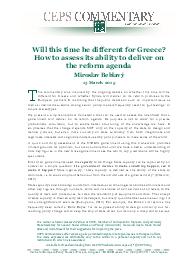De Grauwe, Paul, (2015) “Are creditors pushing Greece deliberately into default?”, 28 April. The Greek drama has entered its endgame. The Greek government has to repay loans to the IMF and other public institutions in the near future but does not have the cash to do so. The lenders refuse to come forward in providing liquidity as long as the Greek government does not accept the conditions they impose. We …Read More
Ireland’s Lessons for Greece
Heise, Michael, (2015), “Ireland’s Lessons for Greece”, www.project-syndicate.org, 23 April. Greece’s government, led by the left-wing Syriza party, is demanding a new deal from its European creditors, claiming that the bailout program provided by the “troika” (the International Monetary Fund, the European Central Bank, and the European Commission) has plunged their country into a spiral of deflation and austerity. But, while no one disputes that things have gone wrong in …Read More
Hall of Mirrors: The Great Depression, The Great Recession, and the Uses-and Misuses-of History
Eichengreen, Barry, (2015), Hall of Mirrors: The Great Depression, The Great Recession, and the Uses-and Misuses-of History, Oxford University Press USA The two great financial crises of the past century are the Great Depression of the 1930s and the Great Recession, which began in 2008. Both occurred against the backdrop of sharp credit booms, dubious banking practices, and a fragile and unstable global financial system. When markets went into cardiac …Read More
Should Greece Pay Back Its Debt?
Ozlem Onaran (2015) “Should Greece Pay Back Its Debt?“, Social Europe Journal, 23 April 2015. Financial speculators are nervously asking whether Greece will pay its debt or default. Political leaders from Europe to the US and the IMF are telling the Greek government to leave aside its democratic mandate and accept further austerity as a condition for getting credit to continue to pay back its debt. But the right …Read More
Greece: On the Gredge, A Greek exit from the euro may soon become inevitable
Greece: On the Gredge, A Greek exit from the euro may soon become inevitable, The Economist, 25 April 2015. Eventually every long-running drama, from “Downton Abbey” to “Dr Who”, feels formulaic. So it is with Greece’s debt saga. For five years it has followed a wearily familiar script of unpayable debts, aborted reforms and 11th-hour compromises that let the country stagger on inside the single currency. That history has …Read More
Modern Greece: What Everyone Needs to Know
Kalyvas, Stathis (2015), Modern Greece: What Everyone Needs to Know, Oxford University Press. Combines the most up-to-date economic and political-science findings on the current Greek crisis with a discussion of Greece’s history Greece’s economic and political future as a member of the European Monetary Union is very unpredictable at the moment, though the decision will have great repercussions for the rest of Europe and the world Makes original historical connections between …Read More
Will this time be different for Greece? How to assess its ability to deliver on the reform agenda
Beblavý, Μ. (2015) “Will this time be different for Greece? How to assess its ability to deliver on the reform agenda“, Centre for European Policy Studies (CEPS) Commentary, 13 March. Τhis commentary was inspired by the ongoing debate on whether this time will be different for Greece and whether Syriza will deliver on its reform promises to the European partners. It is striking thatthe public debate on such an …Read More
The Greek Surge against Austerity: A Blessing or a Curse for the Eurozone?
Panagiotarea, Eleni (2015) “The Greek Surge against Austerity: A Blessing or a Curse for the Eurozone?“, Heinrich-Böll-Stiftung – European Union, 08 April 2015. Syriza’s advent of power was supposed to seriously challenge the eurozone’s austerity orthodoxy and put an end to an economic adjustment programme, which saw Greece’s GDP fall by 25 per cent and unemployment rise by 26 per cent. The radical-left populist party was instrumental in exploiting …Read More
Blame and Punishment? The Electoral Politics of Extreme Austerity in Greece
Rüdig, W. & Karyotis, G. (2015) “Blame and Punishment? The Electoral Politics of Extreme Austerity in Greece“, Political Studies Association, Vol. 63, Issue 1, article first published online: 13 September 2013, pp. 2-24. Can governments that introduce extreme austerity measures survive elections? Contrary to economic voting expectations, the PASOK government in Greece initially appeared to cope quite well, claiming victory in regional elections in 2010 despite widespread anti-austerity protests. …Read More
Who Protests in Greece? Mass Opposition to Austerity
Rüdig, W. & Karyotis, G. (2014) “Who Protests in Greece? Mass Opposition to Austerity“, British Journal of Political Science, Volume 44, Issue 03, July 2014, pp. 487-513. The widespread opposition to unprecedented austerity measures in Greece provides a unique opportunity to study the causes of mass protest. This article reports the results of a survey of the adult population in which two-thirds of the respondents supported protest and 29 …Read More









